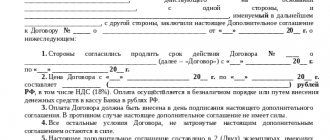How to change government contracts for construction work
From 07/01/2019, 44-FZ introduced new grounds for changing the essential conditions in government contracts for construction, reconstruction, major repairs, demolition of capital construction projects, and work to preserve cultural heritage sites. We collected new bases in a table.
- the contract is concluded for a year or more;
- the price of the government contract is equal to or exceeds 100 million rubles. This is enshrined in paragraph 1(1) of Government Decree No. 1186 of December 19, 2013;
- work is not performed due to circumstances beyond the control of the parties;
- the change will not increase the execution time or price by more than 30%.
How to change the VAT rate in a contract
From 01/01/2019, the VAT rate increased from 18% to 20%, and a new basis for changing essential conditions appeared in the law on the contract system. Changes in the terms of the draft contract under 44 Federal Laws due to adjustments to the VAT rate occur on the basis of Part 54 of Art. 112 of the Law on the Contract System.
Until October 1, 2019, by agreement of the parties, the price of the government contract within the period of its execution increases within the limits of the increased VAT rate if the following conditions are met:
- the contract was concluded until 01/01/2019;
- the terms of the government contract (including when justifying the NMCC) do not provide for an increased VAT rate from 01/01/2019;
- acceptance and payment for goods (work, services) is made after 01/01/2019.
How to improve the subject of the contract
The price of a government contract or the price of a unit of goods (work, service) cannot be changed in this case.
Hello, dear readers of the ABC of Tenders online school! In this article, we will look at what terms of the contract under 44-FZ are considered essential, and also whether they can be changed if necessary. This issue concerns both suppliers and customers, so this article will be equally useful to both parties.
- What are the essential terms of the contract under 44-FZ?
- Changes in the essential terms of the contract under 44-FZ
- Violation of essential terms of the contract under 44-FZ
How to improve the subject of the contract?
44-FZ allows the supply of other goods by agreement between the customer and the contractor, if the quality and characteristics of this product are better than those of the subject of the contract (Part 7, Article 95 44-FZ) states that by agreement of the parties, another product can be supplied.
Changing the contract amount or the price of a unit of goods and services in this case is not allowed.
Parties are not permitted to use this basis to change the country of origin of the goods. Such a prohibition must be determined by legal acts adopted within the framework of Parts 3 and 4 of Article 14 of 44-FZ on the national regime.
What are the essential terms of the contract under 44-FZ?
If we look at 44-FZ, there is no clear indication of what terms of the contract can be considered essential. This information is contained only in the Civil Code of the Russian Federation.
According to Art. 432 of the Civil Code of the Russian Federation, essential are the conditions on the subject of the contract, the conditions that are named in the law or other legal acts as essential or necessary for contracts of this type, as well as all those conditions regarding which, at the request of one of the parties, an agreement must be reached.
Thus, the essential terms of the contract (abbreviated SCC) are those conditions without which the document is considered invalid, and also in respect of which an agreement must be reached.
What can be attributed to such conditions?
- Price;
- Duration of the contract;
- Deadline for fulfilling obligations;
- Subject of the contract (name of goods, works or services);
- Quantity of goods, volume of work (services);
- Payment procedure and terms;
- Responsibility of the supplier and the Customer (amount of penalties);
- Other requirements that are significant in the context of the concluded contract.
Part 1 of Article 34 of 44-FZ states that the contract is concluded on the terms stipulated by the notice (invitation to take part in the procurement), procurement documentation, application, final offer of the procurement participant. Accordingly, the conditions specified in all these documents also apply to the SCC.
Also in paragraph 2 of the letter of the Ministry of Economic Development No. D28i-2286 dated August 3, 2015, the following is said regarding the QMS:
Expert opinion
Kuzmin Maxim Petrovich
Lawyer with 8 years of experience. Specializes in criminal law. Recognized legal expert.
“Law No. 44-FZ does not disclose the content of the concept of “essential terms of the contract.” At the same time, Article 34 of Law No. 44-FZ defines the mandatory conditions for the execution of the contract.
Considering that the legislation of the Russian Federation on the contract system in the field of procurement is based, among other things, on the provisions of the Civil Code of the Russian Federation, a contract concluded within the framework of Law No. 44-FZ must contain the mandatory conditions provided for in Article 34 of Law No. 44-FZ and comply with the requirements, established by the Civil Code of the Russian Federation depending on the subject of the contract.”
In order to avoid future disputes with suppliers, some Customers directly state in the contract which conditions are essential and cannot be changed.
Changes in non-essential terms of the contract under 44-FZ
Neither civil legislation nor 44-FZ define non-essential conditions. However, based on Chapter 28 of the Civil Code of the Russian Federation, we can say that non-essential conditions are provisions of the contract that are not essential for a given transaction and do not require the consent of each party. Changes in non-material conditions under 44-FZ do not affect the result of fulfillment of obligations.
What can be changed in the contract without changing key provisions?
- Payment details. During the work, the parties have the right to adjust current and correspondent accounts and change the bank for transferring money.
- Location of companies. Address and contact details (telephone, email) can be changed without notifying the other party.
- Arithmetic and spelling errors: typos in the name of the organization, in the full names of the parties, erroneous calculations in the specifications that do not coincide with the amount of the contract.
Different stages of procurement (conclusion and execution) have their own characteristics of making changes.
7.1 How to change a contract at the conclusion stage?
The Contractor prepares and sends to the customer a protocol of disagreements indicating the intention to change non-essential conditions and the reasons for such a decision. For example, in connection with a change in the actual address of the company, the “Details” section is requested to be viewed in a new edition. When conducting an electronic procurement, the protocol is sent using the ETP functionality.
If the customer requires adjustment of non-essential provisions, then the functionality of the ETP allows you to revoke the contract for revision and resend the modified version to the participant.
The protocol of disagreements or the revised agreement is studied to determine whether there are significant corrections or not.
In case of changes in non-essential conditions, the contract is signed. If the contractor sent a protocol of disagreements, then the customer changes the contract and the changed version is re-sent to the winner for signature.
Changing a contract due to a technical error in 44-FZ is permitted only if the contract was signed by both parties and posted in the Unified Information System in its original version. Amendments to the contract are made only after it is posted in the Unified Information System.
Moreover, if the error is insignificant, then it would be logical for the parties to ignore it and sign the contract. If the error significantly affects the outcome of the obligations and may lead to fines, then the parties should prepare a protocol of disagreements and correct it.
For example, a change in the conditions in the specification at the stage of concluding a contract (technical error in calculations, etc.) is carried out after the contract is entered into the register of contracts. After identifying an error and registering information about the contract in the Unified Information System, the parties draw up an additional agreement, which amends the contractual terms at the stage of concluding obligations.
7.2 How to change a contract at the execution stage?
The legislation allows for adjustments to non-essential conditions by mutual agreement of the parties at the execution stage. The scheme of actions is the same as described above, the stages of notification and analysis of proposals for changes are repeated, and the third step is the preparation of an additional agreement indicating all the necessary criteria.
The customer will then be required to reflect all changes made to the Unified Information System by posting an adjustment report.
Sample additional agreement:
Changes in the essential terms of the contract under 44-FZ
As a general rule, changing the SCC under 44-FZ is not permissible. However, Article 95 44-FZ lists cases in which such conditions may be changed by agreement of the parties. The main thing is that such a possibility is provided for by the Customer in the procurement documentation and the contract itself.
So what can be changed?
- The price of the contract by agreement of the parties without changing the quantity of goods, the volume of work or services, the quality of the goods supplied, the work performed, the services provided and other terms of the contract;
- The price of the contract, if the quantity of goods, volume of work or service changes by no more than 10%.
- The contract price if regulated tariffs have changed (gas, electricity, water, heat supply);
- Price, quantity of goods (volume of work or service), deadlines for completion, if the government institution’s limits have been reduced;
- The contract price when changing the list of services when treating a citizen of the Russian Federation abroad;
- The quantity of goods supplied in an amount not exceeding the difference between the contract price proposed by the participant and the initial (maximum) contract price (lot price), if this right of the Customer is provided for in the tender documentation, auction documentation.
- The quality, technical and functional characteristics of the product towards their improvement.
Important point! You cannot make changes to the contract at the stage of signing it. Such changes are made only at the stage of its execution by signing an additional agreement by the parties.
Subparagraph “b” of paragraph 1 of part 1 of Art. 95
“... if, at the customer’s proposal, the quantity of goods, work or service provided for in the contract (with the exception of the contract, the subject of which is the execution of construction, reconstruction, major repairs, demolition of a major construction project, work to preserve OKN) is increased by no more than by 10% or the contractual quantity of goods supplied, the volume of work performed or services provided is reduced by no more than 10%. In this case, by agreement of the parties, it is possible to change the contract price in proportion to the additional costs, taking into account the provisions of the budgetary legislation of the Russian Federation. quantity of goods, additional the volume of work or service based on the unit price of the product, work or service established in the contract, but not more than 10% of the contract price. When reducing the quantity of goods, volume of work or service provided for in the contract, the parties to the contract are obliged to reduce the contract price based on the unit price of the goods, work or service. The price of a unit of additionally supplied goods or the price of a unit of goods in case of a decrease in the quantity of the supplied goods stipulated by the contract should be determined as the quotient of dividing the original contract price by the quantity of such goods stipulated in the contract...”
| № | Condition | How to use |
| 1 | Subject of contract | Any goods, works, services, except for construction, reconstruction, major repairs, demolition of a capital construction project, and work to preserve cultural heritage sites. |
| 2 | Method for determining the supplier |
|
| 3 | Procurement stage | Upon execution of the contract |
| 4 | What contract terms can be changed? |
|
| 5 | Amount of change in quantity/volume |
|
| 6 | If several types of goods, works, services are purchased in one contract or work is purchased according to an estimate |
|
| 7 | Change in contract price |
|
| 8 | Other terms of the contract |
|
| 9 | Procedure for changing the terms of the contract |
|
| 10 | When this condition for changing volume/quantity cannot be applied |
|
| 11 | How many times can such changes be made to the contract? | There are no restrictions. But the change in volumes/quantities relative to the original should not be more than 10%. Those. you can change the volume/quantity once by 10% or make changes several times (draw up several additional agreements) until we reach the maximum permissible limit of changes of 10% of the original. |
Violation of essential terms of the contract under 44-FZ
For both the supplier and the Customer, violation of the QMS may result in penalties (fines and penalties), or may even lead to termination of the contract. Fines and penalties for Customers and suppliers are calculated in accordance with the requirements of the Russian Federation Regulation No. 1042 dated August 30, 2017.
For a supplier, unilateral termination of a contract at the initiative of the Customer can lead to even more serious consequences - the inclusion of information about such a supplier in the register of unscrupulous suppliers (URS).
According to Part 5 of Article 7.32 of the Code of Administrative Offenses of the Russian Federation, a change in the terms of the contract, including an increase in the prices of goods, works, services, if the possibility of changing the terms of the contract is not provided for by the legislation of the Russian Federation on the contract system in the field of procurement and such a change led to additional expenditure of funds from the relevant budgets budget system of the Russian Federation or a decrease in the quantity of goods supplied, the volume of work performed, services provided to meet state and municipal needs, entails the imposition of an administrative fine on officials, legal entities in the amount of two times the amount of additionally spent funds of the corresponding budgets of the budget system of the Russian Federation or the prices of goods, works, services, quantity, volume of which are reduced and which were the subject of an administrative offense.
As you understand, changing and violating the conditions specified in the contract is a very serious matter. Therefore, such issues must be approached with great responsibility.
This concludes our article. If the information was useful to you, please like, repost and share this information with your friends and colleagues on social networks.
Still have questions? Then ask them below in the comments, we will be happy to answer them.
Administrative liability for illegal changes in contract terms:
| Composition of an administrative offense | Liability amount | Norm of the Code of Administrative Offenses of the Russian Federation |
| Changing the terms of the contract, including increasing the prices of goods, works, services, if the possibility of changing the terms of the contract is not provided for by the legislation of the Russian Federation on the contract system in the field of procurement | Administrative penalty:
| article 7.32 part 4 |
| Changing the terms of a government contract for a state defense order, including an increase in the prices of goods, works, services, if the possibility of changing the terms of a government contract is not provided for by the legislation of the Russian Federation on the contract system in the field of procurement | Administrative penalty:
| article 7.32 part 4.1 |
| Changing the terms of the contract, including an increase in the prices of goods, works, services, if the possibility of changing the terms of the contract is not provided for by the legislation of the Russian Federation on the contract system in the field of procurement and such a change led to additional expenditure of funds from the corresponding budgets of the budget system of the Russian Federation or a decrease in the number of goods supplied, volume work performed, services provided to meet state and municipal needs | Administrative penalty:
| article 7.32 part 5 |
[1] Part 1, Article 95 of Law 44-FZ
[2] Letter of the Ministry of Finance of Russia dated December 1, 2017 N 24-03-07/79960, dated November 9, 2017 N 24-03-07/73936
[3] Ruling of the Supreme Court of the Russian Federation dated January 21, 2021 N 301-ES20-21798 in case N A31-15420/2018.
[4] Article 19 of Law 44-FZ
[5] Letters of the Ministry of Economic Development of Russia dated December 31, 2014 No. D28i-2884, dated 09.21.16 No. D28i-2476, dated 02.21.2017 N OG-D28-1836, letters of the Ministry of Finance of Russia dated 09.10.19 N24-03-07/69644, from 11.21.19 N24-03-07/90275
[6] Letter of the Ministry of Finance of Russia dated November 3, 2020 N 24-03-06/95838.
[7] Letter from the Ministry of Economic Development of Russia dated November 27, 2015 N D28i-3532
[8] Letter of the Ministry of Finance of Russia dated October 24, 2017 N 24-03-08/69599, letter of the Ministry of Economic Development of Russia dated January 13, 2017 N D28i-166
[9] Resolution of the Seventeenth AAS dated 05/08/2019 N 17AP-4606/19, resolution of the Tenth AAS dated 03/20/2019 N 10AP-2567/19, resolution of the Eighth AAS dated 12/13/2018 N 08AP-12392/18, letter of the Ministry of Finance of Russia dated 21.01 .2020 N 24-03-07/3057, letter from the Ministry of Economic Development of Russia dated 12.12.2016 N D28i-3400
[10] Resolution of the Twenty-first AAS dated January 20, 2020 N 21AP-3841/19, resolution of the North-Western District Arbitration Court dated June 20, 2019 N F07-6981/19 in case N A56-40368/2017, resolution of the Thirteenth AAS dated January 15, 2019 N 13AP-31249/18
[11] Part 3 of Article 103 of Law 44-FZ
[12] Letter of the Ministry of Finance of Russia dated 03/05/2020 N 24-03-07/16668.
Changes in the essential terms of the contract under 44-FZ
- The price of the contract by agreement of the parties without changing the quantity of goods, the volume of work or services, the quality of the goods supplied, the work performed, the services provided and other terms of the contract;
- The price of the contract, if the quantity of goods, volume of work or service changes by no more than 10%.
- The contract price if regulated tariffs have changed (gas, electricity, water, heat supply);
- Price, quantity of goods (volume of work or service), deadlines for completion, if the government institution’s limits have been reduced;
- The contract price when changing the list of services when treating a citizen of the Russian Federation abroad;
- The quantity of goods supplied in an amount not exceeding the difference between the contract price proposed by the participant and the initial (maximum) contract price (lot price), if this right of the Customer is provided for in the tender documentation, auction documentation.
- The quality, technical and functional characteristics of the product towards their improvement.
Contract under 44-FZ: is it possible to change the price?
author of the answer,
Question
We are a budgetary institution and, accordingly, we work according to Federal Law 44-FZ. A year ago, a contract was signed for a period of 3 years for the maintenance and repair of in-house and intra-apartment gas equipment for the same amount. This year, the Contractor unilaterally, based on the Price List, changed the price of the Contract by preparing an additional agreement. Can we sign this agreement?
Answer
For the situation described, Law No. 44-FZ does not provide for the possibility of changing the contract price, therefore signing the agreement will violate the provisions of Art. 34 and Art. 95 of Law No. 44-FZ and will entail administrative liability for the parties in the form of an administrative fine for committing an offense under Part 4 of Art. 7.32 Code of Administrative Offenses of the Russian Federation.
Rationale
As a general rule, it is unacceptable to change the terms of a contract during its conclusion and execution (Part 2 of Article 34 of the Federal Law of 04/05/2013 N 44-FZ “On the contract system in the field of procurement of goods, works, services to meet state and municipal needs”). The exception is the cases established in Art. 34 (when concluding a contract) and Art. 95 (when executing a contract) of Law No. 44-FZ.
When executing a contract, its change is possible if the essential terms of the contract change in accordance with Part 1 of Art. 95 of Law No. 44-FZ.
As provided for in Part 1 of Art. 95 of the Federal Law of 04/05/2013 N 44-FZ “On the contract system in the field of procurement of goods, works, services to meet state and municipal needs”, changes in the essential terms of the contract during its execution are not allowed, with the exception of their changes by agreement of the parties in the following cases:
1) if the possibility of changing the terms of the contract was provided for by the procurement documentation and the contract, and in the case of a purchase from a single supplier (contractor, performer) by the contract:
A)
when the contract price is reduced without changing the quantity of goods, volume of work or service provided for in the contract, the quality of the goods supplied, the work performed, the service provided and other terms of the contract;
b)
if, at the customer’s proposal, the quantity of goods, volume of work or service provided for in the contract is increased by no more than ten percent or the quantity of goods supplied, the volume of work performed or service provided in the contract is reduced by no more than ten percent.
2) if the price of a contract concluded to meet federal needs for a period of at least three years is or exceeds the price established by the Government of the Russian Federation, and the execution of the specified contract due to circumstances beyond the control of the parties to the contract is impossible without changing its terms, these conditions may be changed to based on the decision of the Government of the Russian Federation (Resolution of the Government of the Russian Federation dated December 19, 2013 N 1186);
3) if the price of a contract concluded to meet the needs of a constituent entity of the Russian Federation for a period of at least three years is or exceeds the price established by the Government of the Russian Federation, and the execution of the specified contract due to circumstances beyond the control of the parties to the contract is impossible without changing its terms, these conditions may be changed on the basis of a decision of the highest executive body of state power of a constituent entity of the Russian Federation (Resolution of the Government of the Russian Federation of December 19, 2013 N 1186);
4) if the price of a contract concluded to meet municipal needs for a period of at least one year is or exceeds the price established by the Government of the Russian Federation, and the execution of the specified contract due to circumstances beyond the control of the parties to the contract is impossible without changing its terms, these conditions can be changed on the basis decisions of the local administration (Resolution of the Government of the Russian Federation of December 19, 2013 N 1186);
5) changes in accordance with the legislation of the Russian Federation of regulated prices (tariffs) for goods, works, services (Resolution of the Government of the Russian Federation of December 19, 2013 N 1186);
6) in the cases provided for in paragraph 6 of Article 161 of the Budget Code of the Russian Federation, when reducing the limits of budget obligations previously communicated to the state or municipal customer as a recipient of budget funds. At the same time, the state or municipal customer, during the execution of the contract, ensures the approval of new terms of the contract, including the price and (or) timing of the contract and (or) the quantity of goods, volume of work or services provided for by the contract.
At the same time, by Decree of the Government of the Russian Federation dated December 19, 2013 N 1186 (as amended on May 19, 2015) “On establishing the amount of the contract price at which, or if exceeded, the essential terms of the contract can be changed by agreement of the parties based on a decision of the Government of the Russian Federation, the highest executive body of state power of a constituent entity of the Russian Federation and the local administration, if the fulfillment of a contract due to circumstances beyond the control of the parties to the contract without changing its terms is impossible,” the following amounts of the price of a contract concluded for a period of at least 3 years to meet federal needs, the needs of a constituent entity of the Russian Federation are established Federation and for a period of at least 1 year to meet municipal needs, under which or when exceeding which, the essential terms of the contract can be changed in the prescribed manner, if the fulfillment of the contract due to circumstances beyond the control of the parties to the contract without changing its terms is impossible:
10 billion rubles - for a contract concluded to meet federal needs, with the exception of a contract that includes the performance of work on conducting clinical trials of medicinal products for medical use;
1 billion rubles - for a contract concluded to meet the needs of a constituent entity of the Russian Federation;
500 million rubles - for a contract concluded to meet municipal needs;
40 million rubles - for a contract concluded to meet federal needs, including the performance of work on conducting clinical trials of drugs for medical use.
Changing the essential terms of the contract is also possible in cases where:
- delivery of goods is carried out (performance of work, provision of services), the quality, technical and functional characteristics (consumer properties) of which are improved compared to those specified in the contract (Part 7 of Article 95 of Law No. 44-FZ);
- the parties to the contract have changed (Parts 5, 6, Article 95 of Law No. 44-FZ).
If the parties change the terms of the contract in the absence of grounds provided for by the legislation of the Russian Federation on the contract system in the field of procurement, then in this case the parties may be held administratively liable in the form of an administrative fine for committing an offense under Part 4 of Art. 7.32 Code of Administrative Offenses of the Russian Federation. Signs of this administrative offense can be seen in the actions of both the customer (Decision of the Krasnodar OFAS Russia dated 07/09/2015 in case No. VP-26/2015) and the supplier (contractor, performer) (Resolution of the Arbitration Court of the Ural District dated 08/14/2015 N F09- 5428/15).
| She answered the question: V.A. Lexina, Consultant at IPC "Consultant+Askon" |
VAT rate change
In view of changes in VAT from 01/01/2020 from 18 to 20%, the law provides for a change in the price of a government contract within the specified time frame for its execution by agreement of the parties within the limits of the increased VAT rate if the situation meets the following conditions:
- the contract was concluded until 01/01/2020;
- when justifying the NMCC, as well as other terms of the contract, an increased rate is not provided;
- acceptance and payment of technical and technical equipment is made after 01/01/2020.
Thus, in 2021, government procurement participants received a new opportunity to change the essential terms of the concluded contract.
Improving the subject of the contract
Expert opinion
Kuzmin Maxim Petrovich
Lawyer with 8 years of experience. Specializes in criminal law. Recognized legal expert.
In this case, the price of a unit of GWS and the cost of the contract as a whole are not subject to change. It is also impossible to change the country of origin of the goods in this way.
Changes can only be made at the execution stage. During the conclusion, such amendments are unacceptable.
If the supplier obviously knows that he will not be able to supply the required goods, but still enters into a contract, he is subject to administrative liability under Part 1 of Art. 7.32 Code of Administrative Offenses of the Russian Federation. The same applies to the customer, if he was also aware of this and entered into a contract with the aim of changing its subject matter in the future.
Changing the product for the better is permissible only in relation to the characteristics specified in the contract. Thus, if a new product differs from the original one for the better, for example, in dimensions, but in the contract the dimensions are not initially fixed as a characteristic of the product, and the other characteristics of the goods are equal, changing the subject of the contract is unacceptable, since the condition for improving the characteristics is not met.
It is important that other parameters should not change for the worse.
That is, if you initially order a printer that prints at a speed of 15 pages per minute, but has both color and black and white printing, and the contractor offers to replace it with a device with a speed of 20 pages per second, but only with black and white printing, then , if the condition for the possibility of color printing was specified in the contract, changing the item is impossible.
It is also impossible to change the subject of the contract if the subject of procurement is subject to a regulatory legal act that defines its mandatory characteristics for public procurement, for which the customer does not have the right to go beyond.
What conditions can and cannot be changed during the execution of the contract?
Many public procurement participants are interested in what can and cannot be changed when executing an already concluded contract. This issue will be discussed in this article.
The customer carried out a competitive procedure, determined the winner and signed a contract, but something does not go according to plan. For example, the supplier wants to bring another product or even tell the customer that the contract will be executed by another person.
How is it possible to change the quantity of goods, as well as its price under the contract?
The price and quantity of goods are essential terms of the contract, therefore, by agreement of the parties, they can be changed only in some cases. For example, the contract price can be reduced. This can be done without changing the quantity of goods, their quality and other terms of the contract. Here is the second option: you need to increase or decrease the quantity of goods by 15 percent, but no more. In this case, a proportional increase in the contract price is possible. In case of a decrease in the quantity of goods, the contract price is reduced based on the unit price of the goods. A change in the quantity of goods and a reduction in the contract price is possible provided that this is stipulated by the contract and indicated in the procurement documentation. If the purchase is carried out from a single supplier, such an opportunity should be specified in the terms of the contract.
It is worth considering the following points.
- Budgetary or government institutions that do not have limits so that the price can be increased do not have the right to increase the quantity of goods and its price under the contract by 15 percent.
- If a request for quotation is carried out, an increase in the contract price by 15 percent is not allowed, since a change in the contract price is possible only if it is stipulated in the procurement documentation. When requesting quotes, no documentation is generated (letter of the Ministry of Economic Development No. OG-D28-12811 dated October 2, 2015).
What should the customer do if the supplier delivers the wrong product that he specified in his application?
If the supplier offers a product that is not specified in the contract, the customer is not always obliged to refuse to accept it. If the delivered product turns out to be better than what was originally specified in the contract, then it can be accepted. During the execution of the contract, the law allows for improvements in quality characteristics. It is advisable to draw up an additional agreement to the contract, which should indicate on the basis of what specific characteristics the product is accepted as improved. This document will allow, in case of inspections, to avoid unnecessary questions to both the customer and the supplier. But remember that accepting goods with improved characteristics is the right, not the responsibility of the customer. However, if the supplier delivers a product that is completely different from that specified in the contract, the customer may refuse to accept it and begin the procedure for unilateral termination of the contract. And this threatens the supplier with being included in the RNP for a period of 2 years.
Is it possible to change the contractor in a contract?
The contractor cannot be changed in the contract, since it must be performed by the winner of the purchase. However, there is still one exception: if, while participating in the procurement, the winner underwent a reorganization. In this case, the winner has the right to assign the obligation to fulfill the contract to his legal successor. When the contractor assigns the right to demand payment, changes to the contract are not required. Only the recipient of the payment changes, but the executor of the contract remains the same.
Can someone other than the performer receive payment under the contract?
This situation is possible in a situation where the contract has been fully executed, but the customer has not yet paid for its implementation. When the contractor assigns the right to demand payment, changes to the contract are not required, but the procedure for notifying the customer about this must be followed. Only the recipient of the payment changes, but the executor of the contract remains the same.
Tags : change of conditions,
01 October 2017
Number of views: 2117
Please rate how useful this material was.
Rating: 0/5 — 0 votes
Similar articles:
- Regulations have been approved for checking delivered goods using both video and photographic equipment for compliance with the information under the contract (147)
- Court: in the public procurement notice you can indicate information in the form of a reference to documentation (132)
- FAS RF: when conducting a repeat procurement in the field of construction, the participant will only need to submit “consent” to participate (115)
Comments ()
Write a comment
Termination and refusal
Provided that this was provided for in the contract, the customer may unilaterally refuse the contract in accordance with the provisions of the Civil Code of the Russian Federation on certain types of obligations. Within three days after the refusal, a decision on this must be posted in the Unified Information System and also sent to the contractor.
Moreover, if the contractor has fulfilled his obligations in good faith, the customer cannot terminate the contract without a significant reason. Thus, performers are protected from situations in which the customer could refuse to pay for quality work or services, or goods delivered in accordance with the requirements of the contract.
There is a list of cases in which the customer is obliged to refuse the contract:
- provision by the supplier of false information about the product, in particular, if this allowed him to become the winner of the auction;
- investment production of the subject of the concluded contract has been mastered, created or modernized on the territory of the Russian Federation.
If the contract is terminated due to improper behavior of the contractor, he is entered into the register of unscrupulous suppliers.
The supplier also has the right of unilateral refusal.
In the event of unilateral termination of the contract, the other party must be immediately notified of this, indicating the reason. If the violations are eliminated within 10 days, the decision to terminate is subject to cancellation.
If the violations have not been eliminated, the decision to terminate the contract comes into force. Thus, the contract is considered terminated ten days after the decision is made.
The reason for termination of the contract may be a significant violation of the terms. For example, the delivery of goods with gross discrepancies or a delay in deadlines, resulting in significant losses for one of the parties (we can talk about both a delay in delivery and a delay in acceptance).
A mandatory condition for termination of a contract is the presence in the concluded contract of liability measures for the guilty party. Thus, the victim of the counterparty’s dishonesty can count on compensation for damages.
After a decision is made to terminate the contract unilaterally by the customer and proper notification to the supplier, the latter has 10 days to correct the violations, after which the contract will be terminated and information about the contractor will be entered into the RNP.
Expertise
The customer has the right to carry out an examination regarding the results of the execution of the contract. If, based on the results of the examination, it turns out that the technical and technical specifications do not comply with the terms of the contract, the customer may refuse to fulfill its obligations unilaterally.
The law does not stipulate how verification should be carried out in a particular case.
It is assumed that the examination can be either continuous, that is, relate to the entire volume of delivery, or selective, that is, the results of checking a part of the goods will apply to the entire batch. And also, not only the quality itself is checked, but also, if necessary, completeness, compliance with GOSTs, specifications, and regulations.
The authenticity of the accompanying documents provided by the supplier is also checked.
Some supplies can only be correctly valued after their final sale (for example, fuel). In this case, the expert has the right to rely on consumer reviews.









